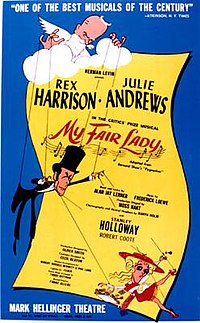My Fair Lady (musical)
| My Fair Lady | |
|---|---|

Original Broadway Poster by Al Hirschfeld
|
|
| Music | Frederick Loewe |
| Lyrics | Alan Jay Lerner |
| Book | Alan Jay Lerner |
| Basis | George Bernard Shaw's play Pygmalion |
| Productions | 1956 Broadway 1957 US Tour 1958 West End 1976 Broadway 1978 UK Tour 1979 West End 1980 US Tour 1981 Broadway 1993 US Tour 1993 Broadway 2001 West End 2005 UK Tour 2007 US Tour 2016/7 Australia Tour |
| Awards | Tony Award for Best Musical |
My Fair Lady is a musical based on George Bernard Shaw's Pygmalion, with book and lyrics by Alan Jay Lerner and music by Frederick Loewe. The story concerns Eliza Doolittle, a Cockney flower girl who takes speech lessons from professor Henry Higgins, a phoneticist, so that she may pass as a lady. The original Broadway, London and film versions all starred Rex Harrison.
The musical's 1956 Broadway production was a notable critical and popular success. It set a record for the longest run of any show on Broadway up to that time. It was followed by a hit London production, a popular film version, and numerous revivals. My Fair Lady has frequently been called "the perfect musical".
On a rainy night in Edwardian London, opera patrons are waiting under the arches of Covent Garden for cabs. Eliza Doolittle, a Cockney flower girl, runs into a young man called Freddy. She admonishes him for spilling her bunches of violets in the mud, but she cheers up after selling one to an older gentleman. She then flies into an angry outburst when a man copying down her speech is pointed out to her. The man explains that he studies phonetics and can identify anyone's origin by their accent. He laments Eliza's dreadful speech, asking why so many English people don't speak properly and explaining his theory that this is what truly separates social classes, rather than looks or money ("Why Can't the English?"). He declares that in six months he could turn Eliza into a lady by teaching her to speak properly. The older gentleman introduces himself as Colonel Pickering, a linguist who has studied Indian dialects. The phoneticist introduces himself as Henry Higgins, and, as they both have always wanted to meet each other, Higgins invites Pickering to stay at his home in London. He distractedly throws his change into Eliza's basket, and she and her friends wonder what it would be like to live a comfortable, proper life ("Wouldn't It Be Loverly?").
...
Wikipedia
